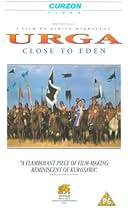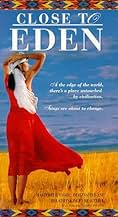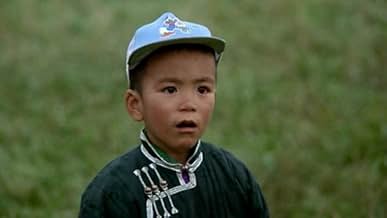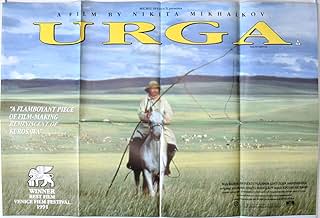PUNTUACIÓN EN IMDb
7,5/10
4 mil
TU PUNTUACIÓN
Se desarrolla una curiosa amistad entre Gombo, un joven pastor mongol que vive con su esposa y su familia en una cabaña, y Sergei, un trabajador ruso cuyo camión se descompone no lejos de la... Leer todoSe desarrolla una curiosa amistad entre Gombo, un joven pastor mongol que vive con su esposa y su familia en una cabaña, y Sergei, un trabajador ruso cuyo camión se descompone no lejos de la cabaña de Gombo.Se desarrolla una curiosa amistad entre Gombo, un joven pastor mongol que vive con su esposa y su familia en una cabaña, y Sergei, un trabajador ruso cuyo camión se descompone no lejos de la cabaña de Gombo.
- Dirección
- Guión
- Reparto principal
- Nominado para 1 premio Óscar
- 5 premios y 12 nominaciones en total
Nikolay Vashchilin
- Nikolai
- (as Nikolai Vachtchiline)
Larisa Kuznetsova
- Marina
- (as Larisa Kuwnetsova)
Nikita Mikhalkov
- Bicycle rider
- (sin acreditar)
Reseñas destacadas
10Fafouin
I had to embrace my aunt after seeing this movie for having brought me to see it. The images are beautiful and the relationships are, at times, complex but always touching. Never have I experienced a filmmaker able to capture the beautiful humanity of each of his characters and their gestures. This film is a treasure and quite possibly my favorite film of all time.
10johan-16
This movie shows us a world without any borders, laws. Just a bunch of people who live in a superb nature, which fills the wide moviescreen in its endless beauty. It reminds us, how far we are away from nature, from our roots of our ancesters. That's why I think this movie appeals the people from all over the world. And especially those who like the widescreen movies from John Huston to Visconti. Only for the superb shots you can see it over and over again. It's, without any doubt a timeless beaty
One of the best films I know: beautiful, pensive, playful, realistic, poetic, humane, up-lifting. In the barrage of trash, one of the few films that makes me believe in humanity. I love this film so much that I arranged home projections for my friends several times. With all the up beat that I am mentioning, it is very open and truthful. Where in an American movie could you see an on-screen slaughter of a real lamb? And it was not ugly or gory at all! On the contrary, it was very decent and sensitive, teaching us respect for Nature.
And another little point. Has anybody noticed the inconspicuous little voice-over at the end which essentially makes "Urga" science fiction?!
And another little point. Has anybody noticed the inconspicuous little voice-over at the end which essentially makes "Urga" science fiction?!
The best definition I can give to movies I greatly admire is that they take me someplace I don't expect to go.
It can be a special location. It can be a special moment. It can be a special revelation.
Close to Eden, as this movie has been titled in the United States, offers the entire combination. A 1992 Russian nominee for the Oscar for Best Foreign Language Film, the movie opens on the vast grassy expanses of the steppes of Mongolia, where the setting initially is evocative of a certain timelessness. The historical instant cannot be ascertained confidently, even within an error margin of a few centuries. Nor do we know what the movie designs ultimately to tell us.
Such uncertainty begins to give way as a vehicle and visitor enter the scene and are involved in a mishap that results from first sleepiness and then fright. The nature of the vehicle and visitor narrow the reference era to an accuracy level of mere decades. From there, the plot leads to a likable nuclear family of herders, to which a grandmother is attached. We follow their story and soon learn when, among the vast expanses of time, it occurs.
The theme here is subtly...ecological...in three parts. The first part concerns the lifestyle of the family, and its self-sufficiency. The second part concerns the travel the father undertakes, and the reason for the travel, an assigned errand he seeks to accomplish in the course of that journey. The third part concerns the conclusion, where the issue of time again intervenes. There is in fact no timelessness, but rather its passage. The narrator in A River Runs Through It is "haunted by waters." Similarly, the ending of Close to Eden is haunted by grasses. Its status as one of the great foreign films arrives in the last few knockout minutes.
It can be a special location. It can be a special moment. It can be a special revelation.
Close to Eden, as this movie has been titled in the United States, offers the entire combination. A 1992 Russian nominee for the Oscar for Best Foreign Language Film, the movie opens on the vast grassy expanses of the steppes of Mongolia, where the setting initially is evocative of a certain timelessness. The historical instant cannot be ascertained confidently, even within an error margin of a few centuries. Nor do we know what the movie designs ultimately to tell us.
Such uncertainty begins to give way as a vehicle and visitor enter the scene and are involved in a mishap that results from first sleepiness and then fright. The nature of the vehicle and visitor narrow the reference era to an accuracy level of mere decades. From there, the plot leads to a likable nuclear family of herders, to which a grandmother is attached. We follow their story and soon learn when, among the vast expanses of time, it occurs.
The theme here is subtly...ecological...in three parts. The first part concerns the lifestyle of the family, and its self-sufficiency. The second part concerns the travel the father undertakes, and the reason for the travel, an assigned errand he seeks to accomplish in the course of that journey. The third part concerns the conclusion, where the issue of time again intervenes. There is in fact no timelessness, but rather its passage. The narrator in A River Runs Through It is "haunted by waters." Similarly, the ending of Close to Eden is haunted by grasses. Its status as one of the great foreign films arrives in the last few knockout minutes.
Urga is an excellent example of the magic of film in allowing people of very different cultures to communicate their various realities and common humanity. To someone like myself coming from a "modern developed culture", I found this tale of a culture that has only recently experienced the impact of "western" society, an entrancing and wonderful experience. It is visually beautiful, frequently wildly funny and life-affirming. For an unusual and extremely accessible film experience - or as a primer for the intending visitor - Urga can be heartily recommended.
¿Sabías que...?
- CuriosidadesThis was the first film nominated for an Academy Award for Best Foreign Language Film from Russia. Previous nominees from that country had been submitted from The Soviet Union. It lost to France's Indochina (1992).
Selecciones populares
Inicia sesión para calificar y añadir a tu lista para recibir recomendaciones personalizadas
- How long is Close to Eden?Con tecnología de Alexa
Detalles
- Fecha de lanzamiento
- Países de origen
- Idiomas
- Títulos en diferentes países
- Close to Eden
- Localizaciones del rodaje
- Empresas productoras
- Ver más compañías en los créditos en IMDbPro
Taquilla
- Recaudación en Estados Unidos y Canadá
- 377.832 US$
- Recaudación en todo el mundo
- 377.832 US$
- Duración1 hora 59 minutos
- Color
- Relación de aspecto
- 1.85 : 1
Contribuir a esta página
Sugerir un cambio o añadir el contenido que falta
























